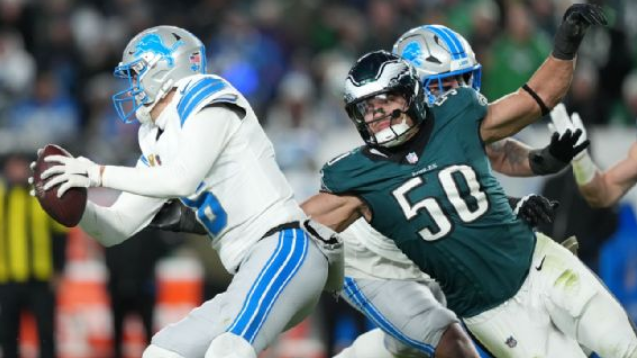Sports
Eagles’ Defense Makes a Statement: Dominating Jared Goff and the Lions
1. Defensive Bravado: A Statement Game in Philly
In a charged Sunday night atmosphere, the Philadelphia Eagles’ defense delivered a performance that resonated across the league. Facing Jared Goff and a Detroit Lions offense known for its precision and explosiveness, the Eagles clamped down relentlessly, holding Detroit to just nine points and forcing one of Goff’s most ineffective outings of the season.
Defensive tackle Jordan Davis set the tone early with an extraordinary sequence of batted passes at the line of scrimmage. Davis managed to deflect three throws, one of which was intercepted by rookie cornerback Cooper DeJean. Jalen Carter, another cornerstone of the Eagles’ defense, added two more tipped passes of his own, creating chaos for Detroit’s timing-based passing game.
This defensive success wasn’t the product of spontaneity — it was the result of detailed film study and preparation. Coaches and players spent the week breaking down Goff’s mechanics, identifying how his arm angle on quick throws often left him vulnerable to deflections. The Eagles practiced drills specifically designed to capitalize on this tendency, simulating plays where linemen timed their jumps and teammates waited behind them for potential turnover opportunities.
The preparation paid off. Goff completed just 38% of his passes — his lowest mark of the season — while facing pressure on 20 dropbacks and enduring seven hits in the pocket. Under duress, he went 0-for-12, marking one of his worst performances when pressured in his career.
The Eagles didn’t merely slow Detroit down — they suffocated them. From the opening drive to the final whistle, Philadelphia’s defense controlled the game, sending a message to the rest of the NFL: to beat the Eagles, you’ll have to escape their defensive vise grip first.

2. High-Leverage Shutdown: Winning When It Counts
One of the defining elements of the Eagles’ dominant performance was their mastery in high-pressure moments. Detroit went 0-for-5 on fourth-down attempts, aggressively pushing chips onto the table only for the Eagles to swipe them aside repeatedly. In these crucial situations, Philadelphia’s defense rose to the challenge with remarkable consistency.
Edge rusher Jaelan Phillips was instrumental in these high-leverage stops. Since joining the Eagles midseason, Phillips has quickly become a force, and against Detroit he delivered six pressures and a sack, repeatedly collapsing the right side of the Lions’ protection. His ability to generate pressure without overcommitting kept Goff uncomfortable and limited Detroit’s ability to extend drives.
Linebacker Nakobe Dean praised Phillips’ seamless integration into the defense, pointing out not only his physical skills but his instinctive understanding of the system and his chemistry with teammates. That cohesion was evident on multiple fourth-down stands, where coordinated pressure and disciplined coverage forced hurried throws or created no running lanes.
The Lions also struggled on third downs, converting only three of thirteen attempts. Their inability to sustain drives, especially in critical situations, underscored how thoroughly Philadelphia dictated the pace and rhythm of the game.
When the game demanded decisive defensive action, the Eagles answered every time. Their situational excellence didn’t just stall Detroit’s offense — it crushed their confidence and shaped the entire momentum of the contest.
3. Film Work and Preparation: Strategy Wins the Game
The Eagles’ defensive masterpiece wasn’t merely the product of superior talent; it was the result of meticulous preparation and strategic ingenuity. Jordan Davis revealed after the game that the defensive coaching staff had recognized a distinct tendency from Goff on film: when under quick pressure or throwing rhythm passes, he often released the ball at a slightly lower angle, making his throws susceptible to deflections at the line.
Recognizing this vulnerability, the Eagles implemented a specialized drill during practice. Linemen were instructed to read Goff’s tendencies, time their jumps, and disrupt passing lanes. Behind them, defensive backs or linebackers waited to capitalize on any batted balls, reinforcing the idea that turnovers could be manufactured, not just stumbled upon.
This forward-thinking approach created a ripple effect. By forcing Goff to alter his trajectory and hesitate on shorter throws, the Eagles pushed the Lions’ offense off its timing — the very foundation of Detroit’s play design. The disruption at the line of scrimmage forced Goff into less comfortable deeper reads, where the coverage unit was ready and waiting.
The secondary complemented the front four perfectly. Safeties maintained tight zones, eliminating easy check-downs, while the cornerbacks stayed disciplined, ensuring that Goff couldn’t rely on quick rhythm throws to escape pressure. The linebackers filled rushing lanes with precision, closing gaps before they could open.
This wasn’t merely a strong defensive outing — it was a coordinated symphony of preparation, anticipation, and execution. Every level of the defense understood the plan, bought into it, and executed it with near-flawless cohesion.
4. Complementary Pressure: A Complete Defensive Attack
While the tipped passes became the headlining statistic of the night, the Eagles’ performance was defined by their all-encompassing pressure strategy. It wasn’t just one star or one tactic — it was a multifaceted defensive attack that overwhelmed Detroit from every angle.
Jaelan Phillips and Nakobe Dean formed a high-energy tandem that constantly harassed Goff. Phillips’ combination of burst and discipline kept him from being neutralized by screens or misdirection, while Dean’s field vision allowed him to diagnose plays quickly and act as a stabilizing force. Their complementary skill sets made it difficult for Detroit to predict or counteract the pressure.
Jordan Davis continued his ascension into elite defensive territory. His interior disruption didn’t just collapse pockets — it forced Goff into awkward movements and created passing lanes that weren’t truly open. His presence created a ripple effect across the defense, drawing double teams and freeing up teammates to create havoc elsewhere.
On a crucial fourth-and-goal attempt in the third quarter, Jayln Hunt and Phillips combined for a perfectly synchronized sack: Hunt delivering pressure low, Phillips hitting high, leaving Goff with no opportunity to escape or make an off-balance throw. This play symbolized the night: coordinated athleticism overpowering Detroit’s protection.
In the secondary, Adoree Jackson broke up a pair of vital passes, including a key late-game knockdown that sealed yet another stalled Detroit drive. His physicality and awareness frustrated Lions receivers all night long.
The beauty of the Eagles’ performance lay in its balance. The defensive line disrupted timing, the linebackers closed gaps, and the secondary eliminated quick reads. This wasn’t brute-force football — it was strategic, synchronized, and devastatingly effective.
5. Implications and Momentum: What This Means for Philly’s Playoff Push
This victory was more than a defensive clinic — it was a tone-setter for the remainder of Philadelphia’s season. With the win, the Eagles improved to 8–2, positioning themselves strongly in the race for the No. 1 seed in the NFC.
What’s more significant is the way they are winning. Their defense, once seen as inconsistent earlier in the season, now appears rejuvenated, cohesive, and capable of shutting down elite offenses. In an NFC landscape filled with high-powered attacks, having a defense that can dictate the terms of engagement is invaluable.
Head coach Nick Sirianni praised the defense’s mentality, noting the unit’s hunger and refusal to rely on past successes. Players echoed this sentiment, emphasizing their commitment to preparation and accountability. This win, built through detailed film study, practice precision, and in-game execution, reflected a team that understands the importance of timing their rise for the stretch run.
For the Lions, this defeat raises questions about their adaptability. Detroit’s offense struggled mightily when forced off rhythm, and their inability to convert on crucial downs highlights an area they must address if they hope to contend in the postseason. Goff’s rough night doesn’t define him, but it does reveal how vulnerable the Lions can be when facing a defense that attacks their tendencies with precision.
For Philadelphia, the implications are clear: this defense is emerging as the heart of the team. If they continue to build on this momentum, the Eagles won’t just be a playoff team — they’ll be a legitimate threat to dominate January football. Their message to the league is unmistakable: this is a defense capable of controlling games, dictating matchups, and powering a deep postseason run.
From: Teetopiaworldus
